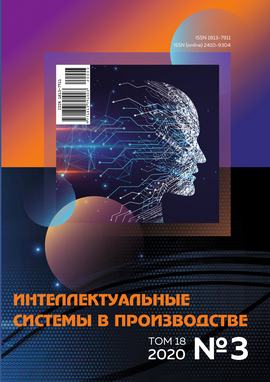Концептуальная модель управления процессами анализа требований и распределения работ при разработке информационных систем
DOI:
https://doi.org/10.22213/2410-9304-2020-3-85-94Ключевые слова:
анализ, управление, модель, процесс, требования, алгоритм, оценка, информационная системаАннотация
Статья посвящена анализу и разработке концептуальной модели управления процессами при разработке информационных систем для оптимизации бизнес-требований разработчика и заказчика за счет системы поддержки принятия решений по анализу требований и распределению работ в зависимости от квалификации и загруженности участников команды разработчика.
В работе для представления взаимосвязи двух процессов была разработана дракон-схема концептуальной модели управления. Первый процесс, анализ требований состоит из двух этапов: первичного анализа требований и формирования плана работы с требованиями. На основании исследования для каждого требования формируется список показателей, позволяющих выявить связь с этапами процесса анализа требований, и осуществляется поиск факторов, влияющих на процесс анализа требований. Процесс проходит несколько итераций до момента, пока все показатели не будут учтены.
По итогам сравнительного анализа показателей и факторов определяется перечень этапов работы с требованием. Этапы формируются в виде списка для формирования плана работ с требованием.
Второй процесс распределения работ – в зависимости от квалификации и нагрузки сотрудников. Представлен алгоритм учета квалификации специалиста в компании, позволяющий провести итоговую оценку специалиста по каждой выявленной функциональной обязанности. Представлены формулы расчета: для определения групп функциональных обязанностей оценки специалиста; значимости ее; самооценки специалиста; оценки специалиста руководителем структурного подразделения и итоговой оценки специалиста по каждой функциональной обязанности. Представлен алгоритм процесса распределения задач, позволяющий определить уровень загруженности по количеству задач, назначенных сотруднику.
Библиографические ссылки
Модели и методы исследования информационных систем : монография / А. Д. Хомоненко, А. Г. Ба-сыров, В. П. Бубнов, А. В. Забродин, С. А. Краснов, В. А. Лохвицкий, А. В. Тырва. СПб. : Лань, 2019. 204 с.
Артюхов А. В., Куликов Г. Г., Речкалов А. В. Логическая структура концептуальной модели информационно-аналитической системы (ИАС), основанной на слабоструктурированных знаниях производственной системы // Вестник Южно-Уральского государственного университета. Серия: Компьютер-ные технологии, управление, радиоэлектроника. 2018. Т. 18. № 4. С. 78–87.
Исследование процесса освоения компетенций инженерами на основе инновационных методов их оценки : монография / В. С. Клековкин, В. П. Грахов, О. Б. Гольцова, Е. В. Гольцова, В. А. Цапок. Ижевск : Изд-во ИжГТУ имени М. Т. Калашникова, 2018. 132 с.
Самонов А. В. Методы и средства автоматизированных информационных систем на основе онтологии «Управление качеством программно-технических комплексов» // Труды института системного программирования РАН. 2019. Т. 31. С. 165-182.
Жилина Н. Д., Лагунова М. В., Таренко Л. Б. Аналитические умения специалистов в области информационных технологий: сущностные характеристики и пути формирования : монография. Н. Новгород : Нижегородский государственный архитектурно-строительный университет, 2018. 115 с.
Коцыняк М. А., Лаута О. С., Нечепуренко А. П. Модель системы воздействия на информационно-телекоммуникационную систему специального назначения в условиях информационного противоборства // Вопросы оборонной техники. Серия 16: Технические средства противодействия терроризму. 2019. № 3-4 (129-130). С. 40–44.
Нормирование требований к характеристикам программных систем защиты информации / А. В. Скрыпников, В. А. Хвостов, Е. В. Чернышова, В. В. Самцов, М. А. Абасов // Вестник Воронежского государственного университета инженерных технологий. 2018. Т. 80. № 4 (78). С. 96–110.
Белов М. В., Новиков Д. А. Сетевые активные системы: модели планирования и стимулирования // Проблемы управления. 2018. № 1. С. 47–57.
Комплексная методика оценивания компетентности сотрудников отрасли связи на основе личностных и профессиональных характеристик / Л. Ф. Данилова, Н. Ю. Захаров, А. В. Никифорова, В. С. Ка-нев, М. В. Облаухова, А. Н. Полетайкин, Ю. В. Шевцова // Вестник СибГУТИ. 2019. № 1. С. 42–61.
Полетайкин А. Н., Ильина Т. С., Данилова Л. Ф. Подготовка классификационных данных для конструирования профессиональных компетенций // Вестник СибГУТИ. 2018. № 2 (42). С. 89–102.
Гольцова О. Б., Гольцова Е. В., Созонова Н. А. Разработка поэтапного математического и алгоритмического обеспечения модели управления по подготовке инженерных кадров // Вестник ИжГТУ имени М. Т. Калашникова. 2017. № 4. С. 100–103.


